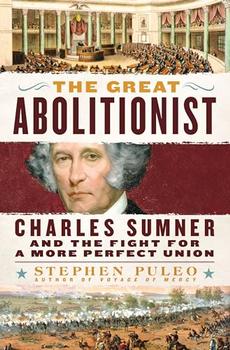Summary | Excerpt | Reviews | Beyond the Book | Readalikes | Genres & Themes | Author Bio

Charles Sumner and the Fight for a More Perfect Union
by Stephen Puleo
To Sumner's way of thinking, the Constitution was a charter of human rights, a protector of freedom, the very guarantee of equality, for all races within the borders of the United States. It codified the linchpin "self-evident" and "all men are created equal" clauses in the Declaration of Independence. The Constitution's guarantee of a "republican form of government" applied to all men, black or white, and such a government could not exist if it embraced, or even tolerated, slavery.
In Sumner's view, the fact that the Constitution did not even contain the word "slavery" proved that the Founders refused to let it "pollute its text," sought to discredit the institution, and concurred with "prevailing opinion, which regarded Slavery as temporary, destined to pass away" of its own accord within a decade or two—unable to survive against the Constitution's guarantees of freedom; the fact that the Constitution included language that banned the slave trade as of 1808 was further evidence of this. Other elements of the Constitution that clearly contradicted the principles of equality—the Three-Fifths Compromise, the insertion of a fugitive slave law—were, in Sumner's view, essentially the same positions espoused by Madison and others—necessary compromises to placate Southern states and ensure the foundational document's passage in the first place.
This would be the essence of the argument Sumner would make throughout his life. Indeed, no other approach made sense to him, nor could any other argument serve as a catalyst for people from many different political persuasions to join, or at least support, the antislavery movement.
* * *
In the early 1840s, Sumner began to more fully express his thoughts on the moral wrong of extending slavery beyond the current states that allowed and depended on the institution, and on refuting the notion that blacks were inherently inferior and thus could not become citizens. He had witnessed for himself in Europe that this belief, widely held both in the North and South, was an evil canard.
Sumner questioned how those who argued in favor of black inferiority reconciled their support for the U.S. Constitution. "If it be urged that the African cannot be a citizen of the U.S., it may be asked if the Constitution was intended to apply only to the Caucasian race," he concluded. If so, where did such limitations to one of America's founding documents end? "Is the Indian race also excluded?" Sumner asked. "Is the Mongolian excluded?"
Sumner's reasoning and the strength of his beliefs about the power within the Constitution to check—and perhaps end—slavery and ensure equal rights placed him in an odd position, sandwiched between conservatives and moderates, who were reluctant to tamper with the current uneasy alliance between North and South, and radicals like Garrison, who wanted to tear down the entire system and start over.
He was stung by criticism from both sides and often felt he was standing alone.
Excerpted from The Great Abolitionist by Stephen Puleo. Copyright © 2024 by Stephen Puleo. Excerpted by permission of St. Martin's Griffin. All rights reserved. No part of this excerpt may be reproduced or reprinted without permission in writing from the publisher.
Your guide toexceptional books
BookBrowse seeks out and recommends the best in contemporary fiction and nonfiction—books that not only engage and entertain but also deepen our understanding of ourselves and the world around us.